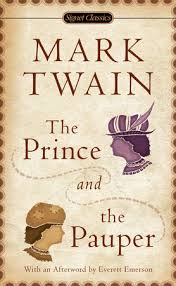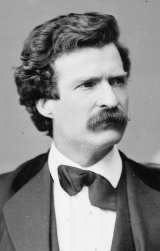The Prince and the Pauper Page #16
The Prince and the Pauper is a novel by American author Mark Twain. It was first published in 1881 in Canada, before its 1882 publication in the United States. The novel represents Twain's first attempt at historical fiction.
John Canty moved off, muttering threats and curses, and was swallowed from sight in the crowd. Hendon ascended three flights of stairs to his room, with his charge, after ordering a meal to be sent thither. It was a poor apartment, with a shabby bed and some odds and ends of old furniture in it, and was vaguely lighted by a couple of sickly candles. The little King dragged himself to the bed and lay down upon it, almost exhausted with hunger and fatigue. He had been on his feet a good part of a day and a night (for it was now two or three o’clock in the morning), and had eaten nothing meantime. He murmured drowsily-- “Prithee call me when the table is spread,” and sank into a deep sleep immediately. A smile twinkled in Hendon’s eye, and he said to himself-- “By the mass, the little beggar takes to one’s quarters and usurps one’s bed with as natural and easy a grace as if he owned them--with never a by-your-leave or so-please-it-you, or anything of the sort. In his diseased ravings he called himself the Prince of Wales, and bravely doth he keep up the character. Poor little friendless rat, doubtless his mind has been disordered with ill-usage. Well, I will be his friend; I have saved him, and it draweth me strongly to him; already I love the bold-tongued little rascal. How soldier-like he faced the smutty rabble and flung back his high defiance! And what a comely, sweet and gentle face he hath, now that sleep hath conjured away its troubles and its griefs. I will teach him; I will cure his malady; yea, I will be his elder brother, and care for him and watch over him; and whoso would shame him or do him hurt may order his shroud, for though I be burnt for it he shall need it!” He bent over the boy and contemplated him with kind and pitying interest, tapping the young cheek tenderly and smoothing back the tangled curls with his great brown hand. A slight shiver passed over the boy’s form. Hendon muttered-- “See, now, how like a man it was to let him lie here uncovered and fill his body with deadly rheums. Now what shall I do? ’twill wake him to take him up and put him within the bed, and he sorely needeth sleep.” He looked about for extra covering, but finding none, doffed his doublet and wrapped the lad in it, saying, “I am used to nipping air and scant apparel, ’tis little I shall mind the cold!”--then walked up and down the room, to keep his blood in motion, soliloquising as before. “His injured mind persuades him he is Prince of Wales; ’twill be odd to have a Prince of Wales still with us, now that he that was the prince is prince no more, but king--for this poor mind is set upon the one fantasy, and will not reason out that now it should cast by the prince and call itself the king. . . If my father liveth still, after these seven years that I have heard nought from home in my foreign dungeon, he will welcome the poor lad and give him generous shelter for my sake; so will my good elder brother, Arthur; my other brother, Hugh--but I will crack his crown an he interfere, the fox-hearted, ill-conditioned animal! Yes, thither will we fare--and straightway, too.” A servant entered with a smoking meal, disposed it upon a small deal table, placed the chairs, and took his departure, leaving such cheap lodgers as these to wait upon themselves. The door slammed after him, and the noise woke the boy, who sprang to a sitting posture, and shot a glad glance about him; then a grieved look came into his face and he murmured to himself, with a deep sigh, “Alack, it was but a dream, woe is me!” Next he noticed Miles Hendon’s doublet--glanced from that to Hendon, comprehended the sacrifice that had been made for him, and said, gently-- “Thou art good to me, yes, thou art very good to me. Take it and put it on--I shall not need it more.” Then he got up and walked to the washstand in the corner and stood there, waiting. Hendon said in a cheery voice-- “We’ll have a right hearty sup and bite, now, for everything is savoury and smoking hot, and that and thy nap together will make thee a little man again, never fear!” The boy made no answer, but bent a steady look, that was filled with grave surprise, and also somewhat touched with impatience, upon the tall knight of the sword. Hendon was puzzled, and said-- “What’s amiss?” “Good sir, I would wash me.” “Oh, is that all? Ask no permission of Miles Hendon for aught thou cravest. Make thyself perfectly free here, and welcome, with all that are his belongings.” Still the boy stood, and moved not; more, he tapped the floor once or twice with his small impatient foot. Hendon was wholly perplexed. Said he-- “Bless us, what is it?” “Prithee pour the water, and make not so many words!” Hendon, suppressing a horse-laugh, and saying to himself, “By all the saints, but this is admirable!” stepped briskly forward and did the small insolent’s bidding; then stood by, in a sort of stupefaction, until the command, “Come--the towel!” woke him sharply up. He took up a towel, from under the boy’s nose, and handed it to him without comment. He now proceeded to comfort his own face with a wash, and while he was at it his adopted child seated himself at the table and prepared to fall to. Hendon despatched his ablutions with alacrity, then drew back the other chair and was about to place himself at table, when the boy said, indignantly-- “Forbear! Wouldst sit in the presence of the King?” This blow staggered Hendon to his foundations. He muttered to himself, “Lo, the poor thing’s madness is up with the time! It hath changed with the great change that is come to the realm, and now in fancy is he king! Good lack, I must humour the conceit, too--there is no other way--faith, he would order me to the Tower, else!” And pleased with this jest, he removed the chair from the table, took his stand behind the King, and proceeded to wait upon him in the courtliest way he was capable of. While the King ate, the rigour of his royal dignity relaxed a little, and with his growing contentment came a desire to talk. He said--“I think thou callest thyself Miles Hendon, if I heard thee aright?” “Yes, Sire,” Miles replied; then observed to himself, “If I must humour the poor lad’s madness, I must ‘Sire’ him, I must ‘Majesty’ him, I must not go by halves, I must stick at nothing that belongeth to the part I play, else shall I play it ill and work evil to this charitable and kindly cause.” The King warmed his heart with a second glass of wine, and said--“I would know thee--tell me thy story. Thou hast a gallant way with thee, and a noble--art nobly born?” “We are of the tail of the nobility, good your Majesty. My father is a baronet--one of the smaller lords by knight service {2}--Sir Richard Hendon of Hendon Hall, by Monk’s Holm in Kent.”
Translation
Translate and read this book in other languages:
Select another language:
- - Select -
- 简体中文 (Chinese - Simplified)
- 繁體中文 (Chinese - Traditional)
- Español (Spanish)
- Esperanto (Esperanto)
- 日本語 (Japanese)
- Português (Portuguese)
- Deutsch (German)
- العربية (Arabic)
- Français (French)
- Русский (Russian)
- ಕನ್ನಡ (Kannada)
- 한국어 (Korean)
- עברית (Hebrew)
- Gaeilge (Irish)
- Українська (Ukrainian)
- اردو (Urdu)
- Magyar (Hungarian)
- मानक हिन्दी (Hindi)
- Indonesia (Indonesian)
- Italiano (Italian)
- தமிழ் (Tamil)
- Türkçe (Turkish)
- తెలుగు (Telugu)
- ภาษาไทย (Thai)
- Tiếng Việt (Vietnamese)
- Čeština (Czech)
- Polski (Polish)
- Bahasa Indonesia (Indonesian)
- Românește (Romanian)
- Nederlands (Dutch)
- Ελληνικά (Greek)
- Latinum (Latin)
- Svenska (Swedish)
- Dansk (Danish)
- Suomi (Finnish)
- فارسی (Persian)
- ייִדיש (Yiddish)
- հայերեն (Armenian)
- Norsk (Norwegian)
- English (English)
Citation
Use the citation below to add this book to your bibliography:
Style:MLAChicagoAPA
"The Prince and the Pauper Books." Literature.com. STANDS4 LLC, 2024. Web. 26 Dec. 2024. <https://www.literature.com/book/the_prince_and_the_pauper_315>.




Discuss this The Prince and the Pauper book with the community:
Report Comment
We're doing our best to make sure our content is useful, accurate and safe.
If by any chance you spot an inappropriate comment while navigating through our website please use this form to let us know, and we'll take care of it shortly.
Attachment
You need to be logged in to favorite.
Log In